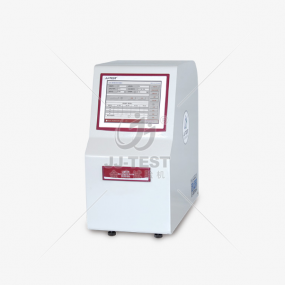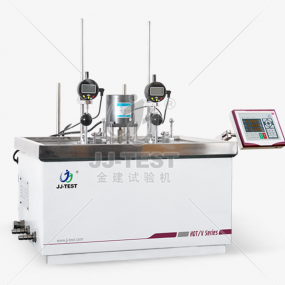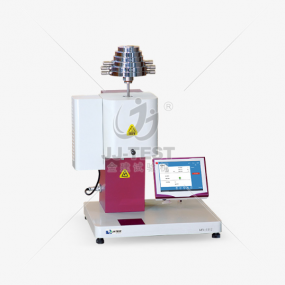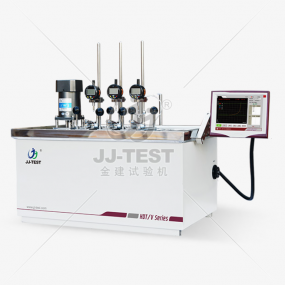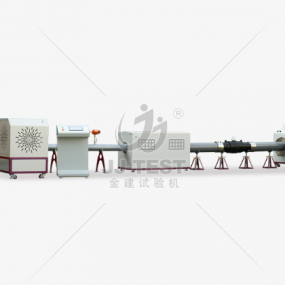JJLB Pipe & fittings Pull-out tester
-
149
-
0765 259 545
JJLB Pipe & fittings Pull-out tester
Model: JJLB
Manufacturer: JJ Test - China
Contact for quotation: 0765 259 545
The JJLB Pipe & fittings Pull-out tester is suitable for testing the drawing resistance of thermoplastic pipes and pipes for fluid transportation when they are subjected to longitudinal tensile forces at different temperatures. Independent station design, no interference between units; pneumatic loading, easy operation; uniform temperature in the test chamber, quick temperature recovery; good integrity and reasonable structure.
Model: JJLB
Manufacturer: JJ Test - China
Contact for quotation: 0765 259 545
The JJLB Pipe & fittings Pull-out tester is suitable for testing the drawing resistance of thermoplastic pipes and pipes for fluid transportation when they are subjected to longitudinal tensile forces at different temperatures. Independent station design, no interference between units; pneumatic loading, easy operation; uniform temperature in the test chamber, quick temperature recovery; good integrity and reasonable structure.
JJLB Pipe & fittings Pull-out tester
Model: JJLB
Manufacturer: JJ Test - China
Contact for quotation: 0765 259 545
Model: JJLB
Manufacturer: JJ Test - China
Contact for quotation: 0765 259 545
Standard: GB/T 15820
Technical Parameter
Number of stations: 3
Applicable pipe range: (Φ16 ~ Φ63)mm
Single station constant load force range: 20N ~ 5000N
Temperature control range: RT ~ 95℃
Temperature indication error: ±0.5
Temperature uniformity: ±2℃
Number of stations: 3
Applicable pipe range: (Φ16 ~ Φ63)mm
Single station constant load force range: 20N ~ 5000N
Temperature control range: RT ~ 95℃
Temperature indication error: ±0.5
Temperature uniformity: ±2℃
Product Similar
JJPOT Pipe Opacity Tester
This instrument is mainly used to determine the opacity of pipes and fittings.The JJPOT Pipe opacity tester overcomes the subjectivity of traditional methods to test the opacity of pipes, and then obtains the true transmittance of tpipes. It consists of optical source, Luminous flux collection system, automatic specimen going in/out controlling system, specimen automatic moving device, specimen support, man-machine communicating touch screen and micro-printer.
Standard: GB/T 21300; GB/T 18742;; ISO 7686
0765 259 545
Mainly used for the determination of the thermal deformation temperature and Vicat softening point temperature of non-metallic materials such as plastics, hard rubber, nylon, electrical insulating materials, long fiber reinforced composite materials, high-strength thermosetting laminates, etc. Convenient operation, precise control, and extremely intelligent.
0765 259 545
MFI-1312 Melt Flow Indexer
Model: MFI-1312
Manufacturer: JJ Test - China
Contact for quotation: 0765 259 545
This instrument is used to test the engineering plastics such as polyethylene, polysulfone, fluoroplastics and nylon with high melting temperature, as well as plastics with low melting temperature such as polyethylene, polystyrene, polypropylene ABS resin and polyformaldehyde resin.
0765 259 545
Standard GB/T 8802, GB/T 5836.1, GB/T 20221, GB/T 18993, GB/T 1634, GB/T 1633, GB/T 10002, ASTM D 648, ASTM D 1525, ISO 306, ISO 75, ISO 2507
0765 259 545
JJPDTM-112 Pipe Fittings Valve Pressure Drop Testing Machine




 SCITEK - China
SCITEK - China EBP - China
EBP - China SOOHOW - China
SOOHOW - China ZD Instrument - China
ZD Instrument - China Yante
Yante JJ-Test
JJ-Test Labthink
Labthink Hunterlab
Hunterlab EURPING - China
EURPING - China Wisdom - China
Wisdom - China ZYLAB - CHINA
ZYLAB - CHINA ERKAYA -
ERKAYA - Novotest - Ukraine
Novotest - Ukraine Moderner - China
Moderner - China GBPI - China
GBPI - China Milkotester - Bulgaria
Milkotester - Bulgaria LAMY RHEOLOGY
LAMY RHEOLOGY  Emco
Emco GESTER - China
GESTER - China GonDo - Taiwan
GonDo - Taiwan Agri-instrument - China
Agri-instrument - China CHN - China
CHN - China PNTOO - China
PNTOO - China TESTER SANGYO
TESTER SANGYO FRU - China
FRU - China Rucca - China
Rucca - China HSIANG TAI - CHINA
HSIANG TAI - CHINA FYI - China
FYI - China Boxun - China
Boxun - China Linshang - China
Linshang - China Hanon - China
Hanon - China PCE - UK
PCE - UK  Biuged
Biuged IRIS
IRIS ACEY - China
ACEY - China 3NH
3NH XS Instruments
XS Instruments Doser
Doser OPTIKA - ITALY
OPTIKA - ITALY Great Safe
Great Safe Kett
Kett Mitutoyo
Mitutoyo Cometech - Taiwan
Cometech - Taiwan Veego
Veego COPLEY SCIENTIFIC
COPLEY SCIENTIFIC  Exotek
Exotek Total Meter
Total Meter PNShar
PNShar Radwag
Radwag SH Scientific
SH Scientific X-Rite
X-Rite Metrotec
Metrotec Hach
Hach Hanna
Hanna Endecotts
Endecotts TRINAMIX
TRINAMIX HMKTEST
HMKTEST PackTest Machines Inc
PackTest Machines Inc CHAO QIANG - CHINA
CHAO QIANG - CHINA Sartorius - Germany
Sartorius - Germany SIKA - Germany
SIKA - Germany Ohaus
Ohaus SUN SCIENTIFIC
SUN SCIENTIFIC Aczet
Aczet Trace2o - UK
Trace2o - UK Glas -Col - USA
Glas -Col - USA Beijing
Beijing ATAGO – JAPAN
ATAGO – JAPAN TECHLAB SYSTEMS
TECHLAB SYSTEMS ESI
ESI RJS - USA
RJS - USA Kruss
Kruss Lumex Instruments
Lumex Instruments ELECTROLAB
ELECTROLAB  Haida
Haida Horiba
Horiba Konica
Konica Datacolor
Datacolor CRYSTE
CRYSTE Uni-T
Uni-T Oxford Instruments
Oxford Instruments Fuzhou Furi - China
Fuzhou Furi - China Alpha MOS
Alpha MOS  Drick
Drick FPInnovations - Canada
FPInnovations - Canada Memmert
Memmert 3M
3M Advantec
Advantec Newstar
Newstar ANTON PAAR
ANTON PAAR
